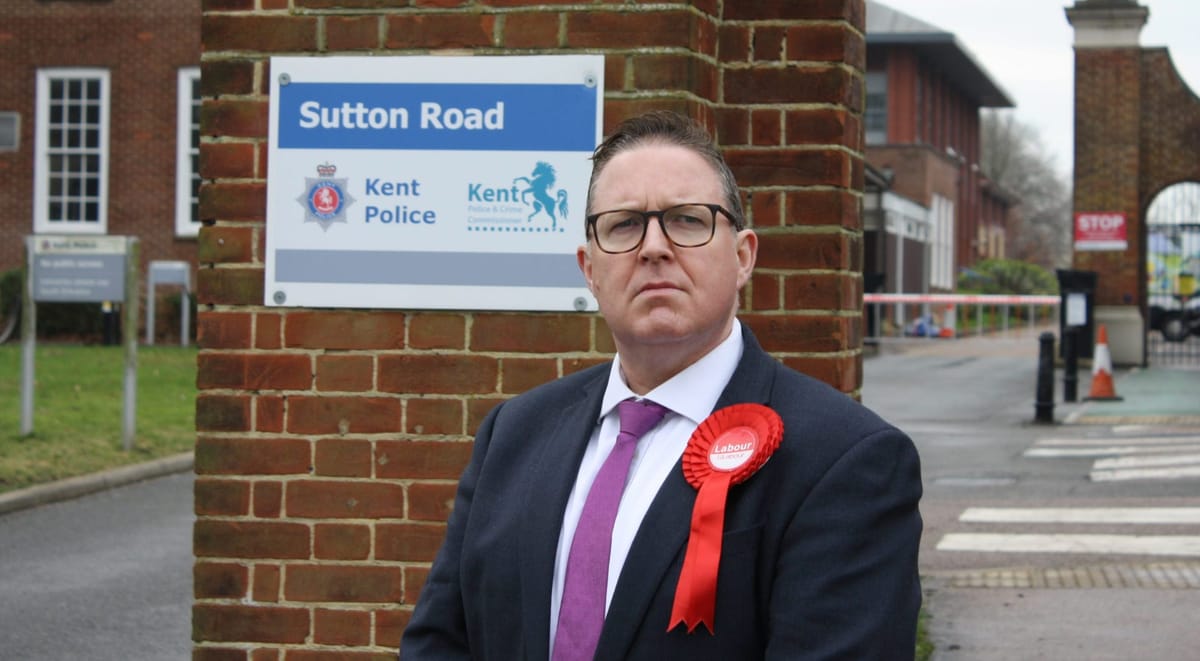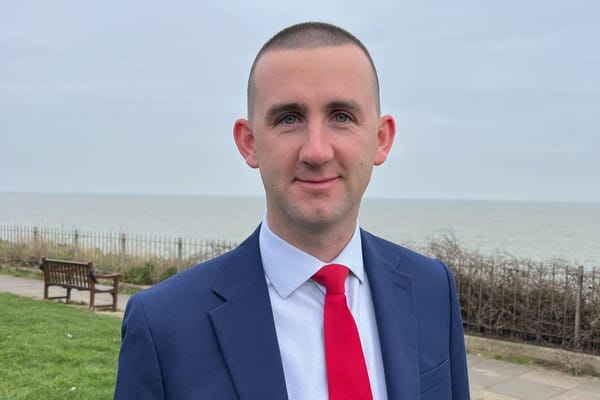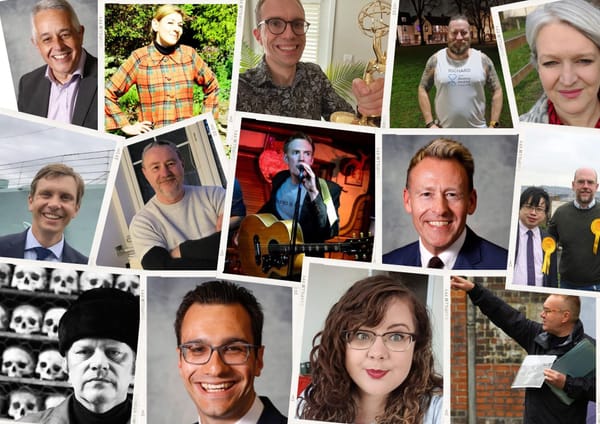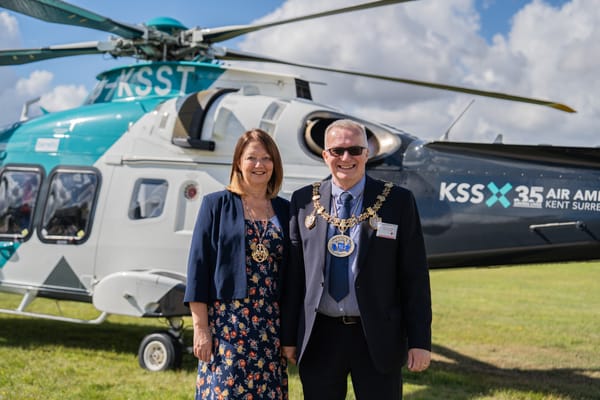"It feels at the moment in politics like all hope is gone"
What Steven asked Lenny Rolles, Labour's candidate for Kent Police and Crime Commissioner

Lenny Rolles is standing to be Kent Police and Crime Commissioner for Labour. Steven met the Gravesham councillor at the Deaf Cat on Rochester High Street to discuss why he joined the Labour Party, why people should vote in the Police and Crime Commissioner elections, retail crime, and more.

Where were you born?
I was born in Dartford at West Hill Hospital. It's no longer there.
Were your parents from the area?
Yeah. My mum and dad grew up in Kent. They were kind of from all over the place, but they grew up in Kent. My dad grew up in Sutton at Hone. My mum was living in Sutton at Hone near South Darenth at the time, too. My mum’s family had moved around a bit but mainly living in Kent.
What's brought you to the Medway Towns?
Er, you. (laughs)
Why have I been brought to the Medway Towns?
You invited me down to the Medway Towns. I've been down a few times in the past couple of months, and I've visited before for Christmas events and that sort of thing, but I've been out knocking on doors for the Police and Crime Commissioner Election to try and find out what it is they are looking for in a Police and Crime Commissioner and to discuss my plans for the role.
What jobs did your parents do growing up?
My mum was a shop worker in the family business. Her parents ran florist shops. My dad was a lighterman and waterman on the River Thames, and a docker. You can track that back all the way back to the 1800s in our family. I was the first oldest son that decided not to work on the river because I was interested in other things. My brother and sister both work on the River Thames now.
How did you find school?
I enjoyed school. I have lots of good friends from school that I'm still in touch with now, but I found it a bit of a struggle in terms of the schoolwork. I was a focused student, but I was involved in extracurricular stuff. I ran for the school Newsround elections. I've always had an interest in politics. I think I was fairly well behaved. I was never expelled or suspended.
Did you stay on for sixth form?
I stayed on. I did A-levels in History, English, Biology and I studied for an AS-level Law at night school.
You went to night school whilst doing sixth form?
I went to adult education classes in Longfield and studied AS-level Law because I'd always wanted to go into law and be a lawyer. I struggled at school. The biggest kind of challenge that I had was they didn’t discover I was a dyslexic until I was at university. I'm fine. I work in comms and communications now, but when you've got a three or four hour exam for an A-level, it didn’t help, and I didn't do as well at my A-levels as I'd hoped. I ended up finding my university through clearing. I didn't go into law, I did business management.
Where did you go to university?
I went to university in Wrexham in North Wales. I used to live right opposite Wrexham's football ground if anyone's seen Disney Plus’ ‘Welcome to Wrexham’. For me, it's quite nostalgic watching that.
Do you play any musical instruments?
No, I used to play the guitar. Badly. Which is probably why I don't play anymore. But no, I don't play. But I love music.
What political parties have you been a member of?
I've been a member of the Labour Party.
When did you join them?
I joined the Labour Party since I've been politically active, since I was at university.
Why the Labour Party?
I think the Labour Party just aligned with my values. To help people, that everyone pulls together for the collective good and trying to do good by communities and not being in it for yourself. Growing up in Sevenoaks, I had a very different political view to most friends that I was at school with. Most were Tories. My dad was a shop steward. He threatened that I'd live in the shed if I joined Margaret Thatcher's party. I mean, that was kind of my grounding in politics.
What was your first full-time job?
I had lots of part-time jobs while I was at school and I think I worked pretty much full-time hours to help see me through uni. My first full-time paid job was as President of my Students’ Union. I'd been involved in student politics for a long while. It didn't pay very well, but it was a great experience.
What is your official occupation now?
I work in public affairs.
What additional roles, paid or unpaid, do you do?
I am trustee of a couple of charities, one around housing. I've been involved with the Gravesend Regatta Committee. I'm also a local councillor for Gravesham, and I have a cabinet level responsibility to deliver on programmes around housing and commercial activity. I've previously served on the cabinet as the cabinet member for commercial services. Local government is facing amazing challenges and difficult cuts that have come down the line from central government to budgets. Just trying to find other ways to provide revenue means that we can carry on delivering services for residents that are important to them.
What does your average day entail?
Getting up, helping get my daughter ready for nursery, dropping her off, then getting back and doing my day job. It's varied from day to day. Then in the evenings, probably finishing my day job and going and attending a council meeting or taking on case work over lunchtime for residents that live in my ward. Weekends normally involve knocking on doors meeting residents. I love speaking with people and finding out what the challenges and issues are, just trying to work out policies and ways that can help make things better for them.
Who has been the best Prime Minister of your life?
It's a challenging one. Well, obviously no Tories. I mean, I grew up under Thatcher. I think Tony Blair's approach to foreign affairs was questionable, but I think you have to look at what the last Labour government achieved in terms of investing in public services, fixing things that had been broken for years under the Tories, the opportunities that were afforded. To people like me to be able to go away to university and be able to be supported at university. The hope to succeed and it feels at the moment in politics like all hope is gone with the current government. I think, obviously, Keir Starmer offers a massive opportunity, and the candidates that we have locally in Medway, with Lauren Edwards and Naushabah Khan, are those local people who can make a real difference.
A usual question I ask is where do you like to go for dinner in Medway? Have you ever been out for dinner in Medway?
Well, it was a great muffin that I just had in the Deaf Cat. I think there's great places to eat across Kent, and I'd love some recommendations to eat in Medway.
What improvements have there been to policing in Kent since the creation of the PCC role?
I don't think you can point to anything. That's perhaps a little unfair. I think the idea of the dual response vehicle, where you have a paramedic on board and a police officer, is a good initiative. I think there's so many failures. Cuts that have been made in terms of neighbourhood policing. Matthew Scott will tell you that the number of police officers have increased. People I speak to on the doorstep, day in, day out, are not feeling that. It’s no wonder. The cuts to back office staff mean that you have police officers spending more time at the station doing paperwork rather than doing visible policing that people are expecting.
What can a PCC do to stop cuts to funding for Kent Police?
I think if you look at what the PCC has done at the moment, they've done very little. Matthew Scott's quite happy to walk around the streets of Kent and Medway with James Cleverley, the current Home Secretary. It took a proposition from the Kent Police and Crime Panel at KCC to force him into writing a letter trying to lobby against the cuts. That came from the police and crime panel rather than him. I'd be standing up for people in Kent and Medway. I'd be saying, ‘This isn't good enough.’ We need more resources.
The turnout for the PCC elections is notoriously low. Why should people vote for the Police and Crime Commissioner?
I would encourage everyone to turn out. It impacts every aspect of their lives as much as local authority elections do, and I'd like everyone to participate in the democratic process.
Why is there a need for a specific policy on retail crime?
Currently, if the thefts are under £200, you get a crime reference number, and that's it. Labour would investigate those crimes because it's an opportunity to see the links between thefts that are taking place, because if you've got someone stealing £100 here, £100 there, then you need to be able to monitor that and change that. The other thing is assaults against shop workers and having a specific offence for dealing with shop workers. It needs to be a specific offence so that crime is recognised on its own, taken seriously and dealt with. If you look at the number of shop workers that are assaulted in the British Retail Crime Survey recently, there's a huge increasing number every year of the number of shop workers that are assaulted. It needs to be recognised with the specific offence so that it can be monitored by the police. They could identify if there's specific areas where there's that kind of level of assault and target resources appropriately to be able to deal with that.
If you are successful in the PCC election, will you carry on as a councillor?
I think my primary focus at that moment would be on being Police and Crime Commissioner and I would look to step down when the time is appropriate.
There's a huge challenge in Medway and Kent in terms of the majority that Matthew Scott has at the moment is huge. I’m aware of that, but I think people are fed up with the Conservatives. Matthew Scott is Rishi Sunak’s candidate in Kent. He's been in post for eight years by the time the next election rolls around. In that time, he's cut the policing budget by £90m with a further £30-35m worth of budget cuts proposed. That will impact policing, it will impact the choices that people make. It’s time for change. I think I'm a positive change, and I will bring change to the policing model in Kent, so that it refocuses on serving the community in places like Medway by dealing with anti-social behaviour. The Peel report found that 35 officers had been moved from neighbourhood policing roles to answering the telephones last year. That’s not right. People expect to see police on the streets. It’s time to refocus those efforts and put victims at the centre of those efforts. My guarantee for Kent is recognising that all communities need support as well and that Rural and coastal crime is dealt with as in urban areas.
Footnotes
This interview has been lightly edited for length and clarity.
You can read our previous interviews here, including Steven’s interview with Police and Crime Commissioner Matthew Scott.
If you have lived or worked in Medway and are planning an event or launch in 2024 or celebrating a significant anniversary and would be happy to talk about it here, or if you want to suggest ideas or send tips for people to interview, please email Steven.
Steven Keevil listened to no music whilst writing this but recommends reading The Glamour Boys by Chris Bryant.




